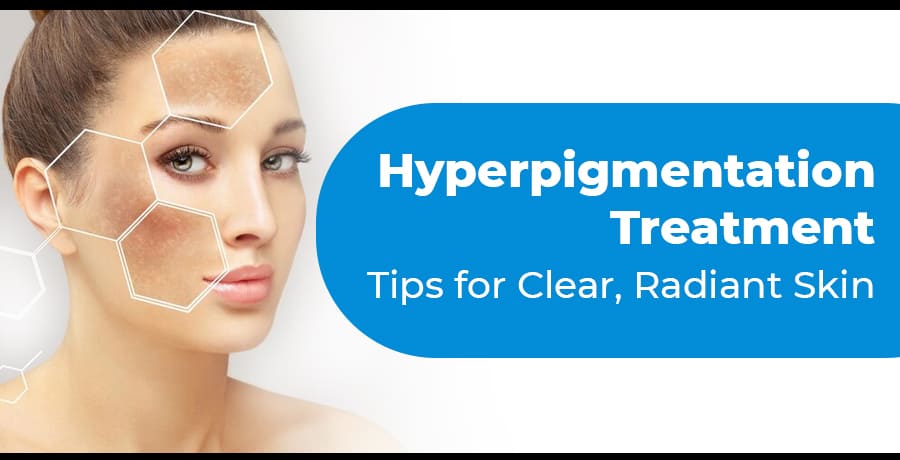
Hyperpigmentation is a common skin condition that occurs when patches of skin become darker than the surrounding skin due to an excess of melanin. Melanin is a pigment that gives skin its color, and when it is overpowered, it can result in hyperpigmentation. There are several underlying causes of hyperpigmentation, including sun exposure, hormonal changes, and post-inflammatory hyperpigmentation, which can result from acne, injury, or other trauma to the skin.
Sun exposure is one of the most common causes of hyperpigmentation. When exposed to the sun, the skin produces more melanin to protect itself from UV radiation. This can result in dark spots, age spots, and other forms of hyperpigmentation.
To prevent sun-induced hyperpigmentation, wearing sunscreen with a high SPF and limiting sun exposure during peak hours is important.
Hormonal changes can also contribute to hyperpigmentation. Pregnancy, menopause, and the use of birth control pills can all cause hormonal fluctuations that can lead to an increase in melanin production.
This can result in conditions such as melasma, which causes dark patches on the face. Hormonal hyperpigmentation usually resolves on its own after hormonal balance is restored, but topical treatments can also effectively reduce the appearance of dark spots.
Post-inflammatory hyperpigmentation can result from acne, injury, or other trauma to the skin. When the skin experiences trauma, it can produce excess melanin in response, resulting in dark spots or patches. To prevent post-inflammatory hyperpigmentation, it is important to avoid picking or squeezing pimples and to treat acne promptly to prevent scarring.
Dealing with hyperpigmentation can be frustrating, but there are several effective treatments available. Topical treatment such as hydroquinone, retinoids, and vitamin C can help reduce the appearance of dark spots and even skin tone.
Chemical peels and laser treatments can also be effective in reducing hyperpigmentation. In addition, it is important to maintain a healthy skincare routine, including regular exfoliation and moisturizing, to keep the skin healthy and radiant.
Before starting any treatment for hyperpigmentation, it is crucial to identify the underlying cause. This will help determine the most suitable approach to address the issue.
For example, if the cause of hyperpigmentation is sun damage, then the primary focus should be sun protection and topical treatments that can help fade the dark patches. On the other hand, if hormonal changes are the cause, then hormone therapy or medications may be required to address the issue.
Topical treatments ingredients such as hydroquinone, retinoids, vitamin C, and kojic acid effectively reduce dark spots and promote skin cell turnover. These products work by inhibiting melanin production and promoting the removal of pigmented skin cells.
Chemical peels are another popular treatment option for hyperpigmentation. They involve applying a chemical solution to the skin, which exfoliates the top layer and stimulates cell turnover. This process can help fade dark spots and even skin tone over time. Different types of chemical peels are available, ranging from mild to deep, so it is essential to consult a skin care professional to determine the most suitable option for your skin type.
For more stubborn cases of hyperpigmentation, laser therapy can be an effective treatment option. Laser treatments target the melanin in the skin, breaking down excess pigment and promoting collagen production. This results in clearer, more even-toned skin. It is essential to undergo laser therapy under the supervision of a qualified dermatologist or skincare specialist to ensure safe and effective results.
One of the most crucial steps in treating and preventing hyperpigmentation is sun protection. UV exposure can worsen existing dark spots and trigger the production of more melanin. Apply a broad-spectrum sunscreen with an SPF of 30 or higher daily, even on cloudy days.
Wearing protective clothing, hats, and sunglasses can also help shield your skin from harmful UV rays. In addition to professional treatments, maintaining a healthy lifestyle can support your skin's natural healing process.
Eating a balanced diet rich in antioxidants, staying hydrated, getting enough sleep, and managing stress can all contribute to overall skin health. Incorporating gentle skincare products and avoiding harsh chemicals or excessive exfoliation can also help prevent further damage to the skin.
For personalized hyperpigmentation treatment plans and expert skincare advice, schedule a consultation with Dr. Anup Dhir. Don't let hyperpigmentation hold you back from feeling confident in your skin – take the first step towards a brighter complexion!

